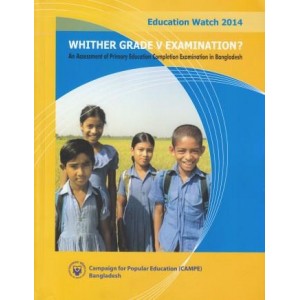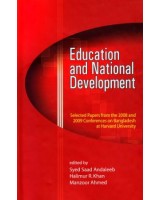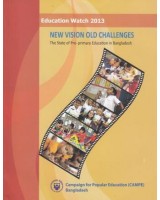Shopping Cart
0 item(s) - U$0.00- Agriculture +
- Anthropology
- Archaeology
- Arts & Photography +
- Bangladesh Studies
- Biographies & Memoirs +
- Business, Economics & Investing +
- Children's Books
- Development Studies
- Education & Reference +
- History +
- Home, Garden & Hobbies +
- Journals & Reports
- Law +
- Literature & Fiction +
- Population and Housing Census
- Reference Book +
- Religion & Spirituality +
- Sciences & Technology +
- Social Sciences +
- Travel +
- Women's Studies
- Statistics
Education Watch 2014: Whither Grade V Examination? An Assessment of primary education completion examination in Bangladesh
Authors: Campaign for Popular education (Author)
Edition: 1st edition
ISBN: 9789843394347
Page: 252
Format: Paperback
Language: English
Publication Date: June 1, 2015
Product Code: 5156
Availability: In Stock
Condition: New Book, Never used
Qty:
CAMPE serves as the secretariat of Education Watch. CAMPE as part of its commitment to effective implementation of EFA works as an umbrella for its partner NGOs.
Education Watch Bangladesh was set up in 1998 by a group of like-minded individuals and organizations concerned about educational development in the country. The need for embarking on such an initiative was expressed in the National Conference on Universal Primary Education two years earlier in 1996. The Conference, held in Dhaka, was organized by a cross section of civil society representatives and inaugurated by the then Prime Minister of Bangladesh. Weaknesses in monitoring the EFA effort, especially the lack of valid and reliable information necessary for developing policies and plans were identified as primary constraints to ensure proper implementation of the EFA. Education Watch was thus born with the initiative and support of interested individuals and non-government organizations.
The broad aim of Education Watch was to take on the role of an independent, research-based monitoring mechanism for assessing progress in EFA. The specific aims are as follows:
|
|
Conduct periodic independent review of the state of primary and basic education through research, surveys and studies and publish annually a report on aspects of basic and primary education. |
| Disseminate the findings of the research to all stakeholders at various levels in order to enhance public awareness about education and promote public participation in educational policy dialogue. | |
| Engage in advocacy in support of quality Education for All in the country. |
At the beginning, two committees were formed to guide and oversee EW activities – the Advisory Board and the Working Group. Individuals with known professional expertise in their individual capacities were included in these bodies. Another body called the Technical Committee was also formed later. Distinguished people including researchers, academics, activists and education officials are members of the committees. There were 25 persons involved in these bodies of Education Watch in 1998; the number increased to 71 for Education Watch 2000-10.
Selection of Issues
A new theme mainly related to primary and basic education is selected for each year’s Education Watch research. An extensive participatory process is followed to get comments and feedback from concerned individuals and agencies on the selected issue. The Working Group is responsible for identifying the research questions, selecting the indicators, and finalizing the instruments. A Research Team is formed taking people from the Working Group and outside. This team is responsible for carrying out the fieldwork and writing the report. The Technical Team provides technical support to the Research Team.
|
|
The first Education Watch explored ‘internal efficiency’ of primary education in Bangladesh. The indicators considered were access/enrolment, drop-out, physical facilities in school, teacher training and qualifications, community/parental participation, mobility to higher grades, supply of books and learning aids, school supervision, and student achievement in nationally prescribed basic competencies. |
| In the second one, the learning achievement of students completing the primary cycle was the main focus. Student learning achievement was assessed on the basis of terminal competencies at the end of the primary education phase identified by the National Curriculum and Textbook Board (NCTB). The situation of teacher training was also explored in this study. | |
| The third Watch revisited some of the internal efficiency indicators and collected information on private expenditure for schooling, school budgets, and self-rated literacy of the population. | |
| The fourth one was an in-depth exploration of the literacy situation in the country. | |
| The fifth Watch was on quality and equity issues at the primary education level. | |
| The sixth one was on the progress and challenge of secondary education. | |
| The seventh Watch was on financing primary and secondary education in Bangladesh. | |
| The eighth Watch explored the quality and equity issues at the secondary education level. | |
| The ninth Watch revisited the progress and challenges at the secondary education level. | |
| The tenth one explored the reasons for low performance in education in Sylhet Division. | |
| The eleventh Watch will be on Technical and Vocational Education (TVET). |
Effectiveness
|
|
Education Watch has established itself as an independent, alternative and complementary system of monitoring EFA. |
| A large number of national experts, practitioners in education and civil society representatives has actively participated in every step of Education Watch studies. | |
| Although competency-based education was introduced at primary level in 1992, Education Watch first initiated competency-based assessment of learning achievement. | |
| EW established a benchmark for literacy status of the population through an in-depth exploration. For the first time, test-based literacy assessment with nation-wide samples was undertaken in Bangladesh. | |
| Media provided good coverage of the findings which helped in dissemination of findings and raising awareness of the people. | |
| Despite the government reservation on the existing scenario presented in the Education Watch report on the existing status of primary education, the government has not fully rejected its validity. This is quite apparent in the government initiatives as reflected in the PEDP II, the macro framework for primary education development that has addressed many of the concerns raised in the Education Watch reports. | |
| From the donors side, it is more often than not referred to and treated as a reliable database. As such they are always keen to know the latest updates. | |
| The Education Watch reports are used as reliable database by researchers, educators and other members of the civil society. | |
| CAMPE in many cases uses the Education Watch groups and other stakeholders to lobby with the government in favor of a gender sensitive approach in the policy framework. In this context women leadership at the highest level, have to some extent served useful to gain access and affirmative decision. | |
| The tenth one explored the reasons for low performance in education in Sylhet Division. | |
| The eleventh Watch will be on Technical and Vocational Education (TVET). |
Dissemination and Follow-up
The Watch reports each year has been made public and launched in a high profile public ceremony with the presence of policy-makers, planners, academics, representatives of NGOs and civil society organizations
The Education Watch reports each year created a flurry of headlines, editorials, special feature articles and a public debate which helped to make public aware of the issues and influence public opinion.
The national level highly publicized launching has been followed by a series of seminars and workshops at the sub-national levels – in the six divisions and some districts. This follow-up is carried out on demand from and in cooperation with local NGOs and civil society groups. Some of the important outcomes of sub-national dissemination activities are:
|
|
Creating a space and scope for local functionaries and civil society groups to interact with the EW effort. |
| EW gets an opportunity to share views and findings on critical educational issues with local groups, receive feed-back and influence public opinion. | |
| EW's and CAMPE's role in advocacy is strengthened. | |
| Getting an insight into field level realities, complementing and enriching research findings. | |
| Creation of demand for “user friendly” versions of the Education Watch reports for use at the grass root level. |
Challenges
|
|
Although the government has not rejected it outright, it also does not openly accept it. |
| The civil society does not question the validity of the Education Watch reports but has expressed its concern whether the statistical sample is representative of the situation. | |
| The Education Watch group is quite gender sensitive but it is hard to get highly qualified women researchers to make a gender balanced team. The group itself is not gender balanced, but the field teams are equally representative. | |
| Indiscriminate use of Education Watch findings by the media and professional researchers at times create confusion and misunderstanding at different levels. |
Write a review
Your Name:Your Review: Note: HTML is not translated!
Rating: Bad Good
Enter the code in the box below:
Do you have any questions about Education Watch 2014: Whither Grade V Examination? An Assessment of primary education completion examination in Bangladesh?
 Your Name:
Your Name: Your Email:
Your Email: Your Question:
Your Question:
Enter the code in the box below:


 (
(
